RECOMMENDED
Performances are outstanding and the production design sensational, the director is Michael Michetti (need I say more?), and the ideas put forth are provocative, but an overreliance on monologs proves off-putting in the West Coast Premiere of Eric Cable’s two-hander My Barking Dog, the latest from The Theatre @ Boston Court.
“People ask me if this is really how it ended. People ask me if this is how it began. As if there was a thread holding the two together. As if the jungle we’re in now could be time-reversed from full arcing trees back into shoots, back into kernels wedged by dirty fingernails into hungry soil,” proclaim a pair of voices, one male, one female, heard but not seen.
With these (at least initially) cryptic words playwright Coble opens My Barking Dog, keeping us quite literally in the dark for the first minute or so, the voices assuring us that what we’re about to see “may not all be accurate … but it’s all true.”
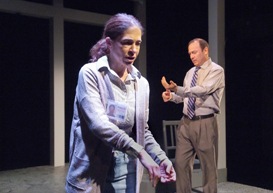 The lights then come up on Melinda (Michelle Azar) and Toby (Ed F. Martin), she going about her night-shift duties in her dreary printing factory job, he moving through his own space doing what we will soon learn is searching his apartment, laptop in hand, for a wi-fi signal to steal.
The lights then come up on Melinda (Michelle Azar) and Toby (Ed F. Martin), she going about her night-shift duties in her dreary printing factory job, he moving through his own space doing what we will soon learn is searching his apartment, laptop in hand, for a wi-fi signal to steal.
And the pair’s alternating monologs begin.
Melinda tells us about the CD booklets she prints out unaware of what kind of music the lyrics are set to, then wonders aloud whether in some CD factory a similar night-shifter might just find one of her booklets useful in understanding the lyrics.
A jobless Tony lets us in on how he passes time by listening to his neighbors and then filling in the blanks on lives he can hear but not see. “The guy to the left of me likes jazz,” Toby informs us, “but only up to 1950. He bails at bop.”
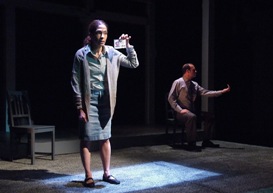 We learn that in the fourteen years Melinda has been employed at the factory, she has worn the exact same I.D. badge day after day, her face having changed not an iota since her arrival, while in the meantime a fellow worker’s face deteriorated so quickly that within a matter of months he was dead of old age.
We learn that in the fourteen years Melinda has been employed at the factory, she has worn the exact same I.D. badge day after day, her face having changed not an iota since her arrival, while in the meantime a fellow worker’s face deteriorated so quickly that within a matter of months he was dead of old age.
Tony philosophizes on his need to find free wi-fi from inside his apartment. (He doesn’t have the money to patronize a coffee shop and crazy homeless Internet surfers make the public library a no-no as well, not to mention the time the librarian accused him of ordering butt-plugs online when it was the person before him who had “left some blaring porn ad gyrating on my screen.”)
Tony and Melinda’s monologs don’t end there, however, shifting significantly to the night visitor who will eventually bring the duo together.
Tony: “The first thing that goes through my mind is ‘someone’s dog got loose.’ and then … I realize it’s not a dog.”
Melinda: “The first thing my mind thought was ‘Wolf!’”
It turns out that the animal in question is neither dog nor wolf but coyote, Tony’s online research revealing facts about the wilderness creature (“They eat pigeons, squirrels, rabbits, cats, small dogs …”) while an Internet-less Melinda can only wonder, “What right does he have to live in my city?”—a question that soon becomes “What right does my city have to be in his life?”
In either case, this is not the last time Tony and Melinda will encounter their coyote, and therein lies the crux of what transpires from this point on.
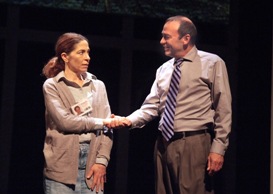 It takes an overlong twenty-five minutes for Tony and Melinda to finally meet, and even after their first conversation, the pair make frequent returns to monolog-land, even as they embark on a journey that will lead to paths neither could possibly have imagined, even in their wildest dreams.
It takes an overlong twenty-five minutes for Tony and Melinda to finally meet, and even after their first conversation, the pair make frequent returns to monolog-land, even as they embark on a journey that will lead to paths neither could possibly have imagined, even in their wildest dreams.
My Barking Dog has much to say about how America’s rapidly expanding urbanization has impacted nature, playwright Coble making it quite clear how and why eco-terrorists are spurred into action by those who see no harm in (to paraphrase Joni Mitchell) paving paradise and putting up parking lots … and worse.
And if you think the path one character takes may be a rather over-the-top reaction to said urbanization, just wait till you see how another’s nightmare becomes the bizarrest of credibility-stretching realities.
I may not be this overly wordy play’s greatest fan, but I do salute The Theatre @ Boston Court’s giving it that most elusive of phenomena—a second production, and by all indications a far more spectacularly designed staging that the barer-bones World Premiere it got four years ago at Cleveland Public Theatre.
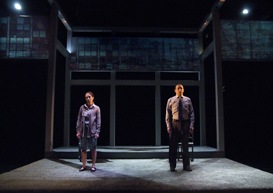 Spectacular indeed are the surprises that scenic designer Tom Buderwitz’s initially stark urban set has in store (and which production stills purposely avoid spoiling). Spectacular too is sound designer John Zalewski’s mix of city and desert sounds coupled with that distinctive, tension-building “Zalewski hum.” Tom Ontiveros’s lighting and video design is equally striking, with Garry Lennon’s just-right costumes revealing much about Tony and Melinda and they journey each embarks upon. And there are some fabulous “body makeup effects” as well.
Spectacular indeed are the surprises that scenic designer Tom Buderwitz’s initially stark urban set has in store (and which production stills purposely avoid spoiling). Spectacular too is sound designer John Zalewski’s mix of city and desert sounds coupled with that distinctive, tension-building “Zalewski hum.” Tom Ontiveros’s lighting and video design is equally striking, with Garry Lennon’s just-right costumes revealing much about Tony and Melinda and they journey each embarks upon. And there are some fabulous “body makeup effects” as well.
Most significant of all in director Michetti’s optimization of Coble’s problematic script are the superb performances he has elicited from the pitch-perfectly cast Azar and Martin in roles that may well be the most physically demanding each has ever undertaken. My Barking Dog takes geeky Melinda and nerdy Tony to places neither could have imagined, giving its two stars character arcs that wind up leaving the dull-lived city dwellers about as far from where they started as any actor could wish for, and both Azar and Martin can thank their lucky stars that The Theatre @ Boston Court comes equipped with state-of-the-art cleanup facilities.
Matthew Quinlan is dramaturg. Casting is by Julia Flores. Alyssa Escalante is production stage manager.
Assistant director William Hickman and understudies Benjamin Burdick and Charlotte Gulezian will get to strut their own stuff on May 4 and 6.
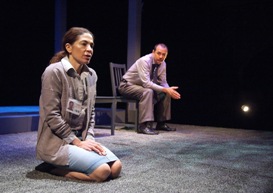 Though My Barking Dog does not merit the unqualified raves that greeted recent Stage Raw Theater Award winners Stupid Fucking Bird and Everything You Touch, it does at the very least allow two of our most gifted Los Angeles Actors Equity members to show off their professional expertise in a production made possible by AEA’s unilaterally gutted 99-seat plan, while surrounding them with a production design that any New York stage would proudly feature at ticket prices two or three times what The Theatre @ Boston Court charges for theirs.
Though My Barking Dog does not merit the unqualified raves that greeted recent Stage Raw Theater Award winners Stupid Fucking Bird and Everything You Touch, it does at the very least allow two of our most gifted Los Angeles Actors Equity members to show off their professional expertise in a production made possible by AEA’s unilaterally gutted 99-seat plan, while surrounding them with a production design that any New York stage would proudly feature at ticket prices two or three times what The Theatre @ Boston Court charges for theirs.
And that is indeed something to bark about.
The Theatre @ Boston Court, 70 N. Mentor Ave., Pasadena.
www.bostoncourt.org
–Steven Stanley
April 25, 2105
Photos: Ed Krieger
Tags: Los Angeles Theater Review, The Theatre @ Boston Court



 Since 2007, Steven Stanley's StageSceneLA.com has spotlighted the best in Southern California theater via reviews, interviews, and its annual StageSceneLA Scenies.
Since 2007, Steven Stanley's StageSceneLA.com has spotlighted the best in Southern California theater via reviews, interviews, and its annual StageSceneLA Scenies.







 COPYRIGHT 2025 STEVEN STANLEY :: DESIGN BY
COPYRIGHT 2025 STEVEN STANLEY :: DESIGN BY